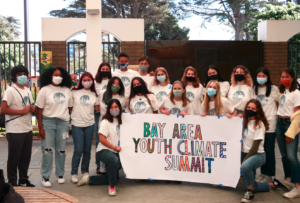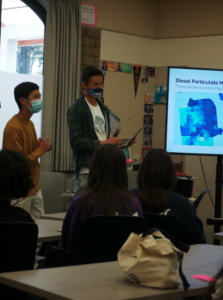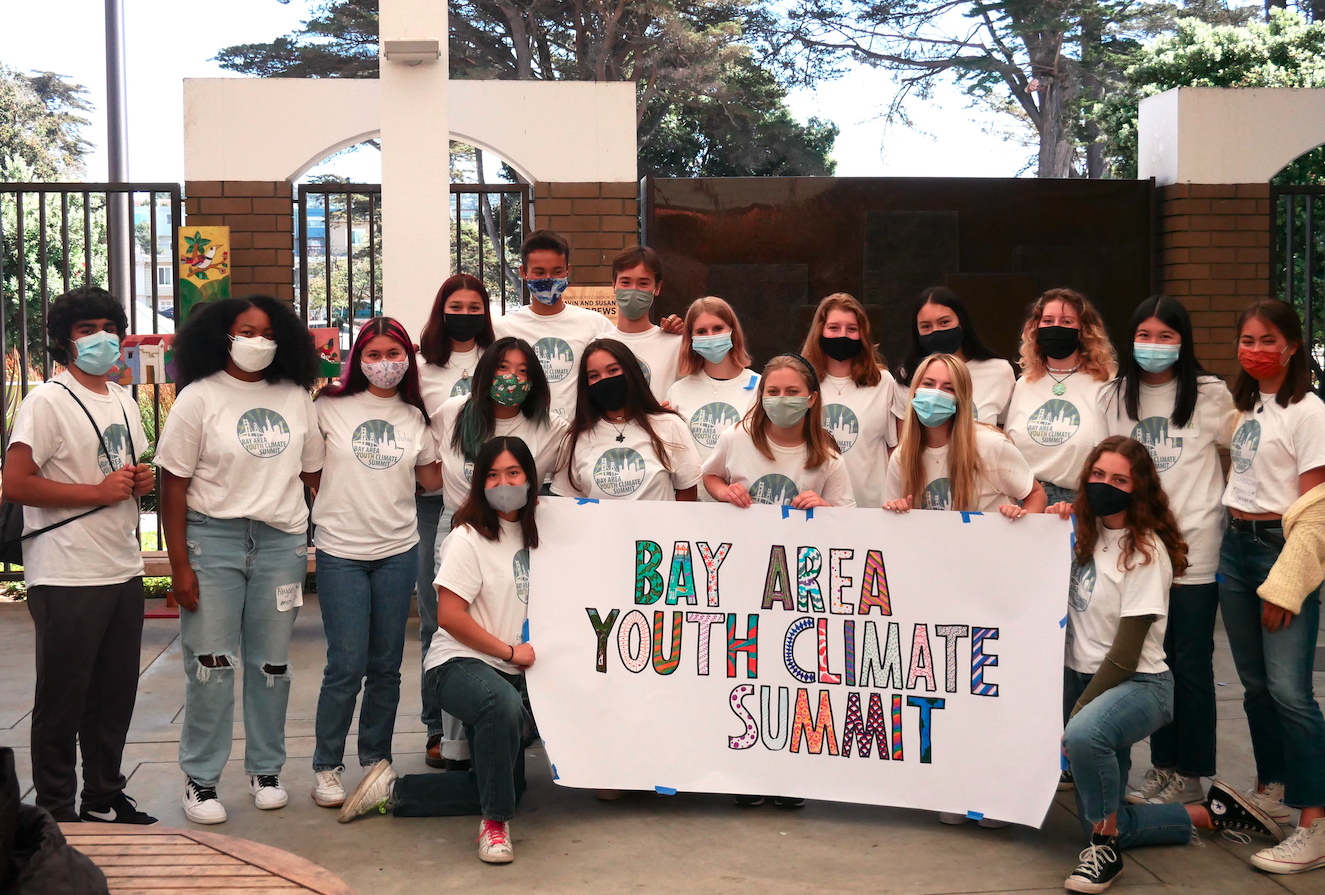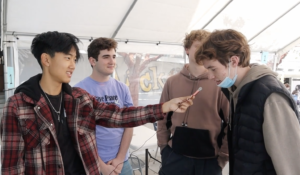The Bay Area Youth Climate Summit (BAYCS) hosted its second annual climate summit on October 9 and 10. Virtual and in-person components helped to create connections among youth who care and are interested in learning more about climate activism.

photo courtesy of Amelia Fortgang
The BAYCS was created by Lick-Wilmerding High School senior, Amelia Fortgang ’22, with the purpose of creating a community of youth who were passionate about creating change.
Fortgang also organized the Youth Advisory Council of 25 youth from the Bay Area who helped create workshops and plan the summits.
Last fall during COVID quarantine, the BAYCS hosted their first climate summit over Zoom. They were able to mobilize nearly 300 students from around the world. The summit involved workshops, guest speakers and an activity to create Climate Action Plans (CAPs). In that meeting, students designed a protocol to improve their impact on the planet, such as adding compost bins or TerraCycle.
The BAYCS also hosted a virtual Earth Day summit on April 22, 2021, designed to focus on policies and direct action surrounding climate change. The event involved learning about various laws and organizations with a focus on a climate change initiative. Students also worked on CAPs that could be implemented at their schools.
Following the success of these two summits, the BAYCS organized its second annual climate summit.
The BAYCS held the summit over two days, with one virtual and one in-person meeting.
“I think we could have done it just in-person this year, but we really liked the global reach that we got last year, and we liked that people were able to come from different states and different countries and that Bay Area youth got to have conversations with youth from all over the world,” said Fortgang.
Aletta Brady, the founder of Our Climate Voices (OCV), kicked off the virtual summit on October 9 with a presentation about their work with OCV. Brady talked about how community action, such as telling stories about climate disasters, is a great way to promote the voices of people most affected by climate change.
Afterward, students could attend one of eight workshops about climate justice, including topics such as how social media affects the ways people communicate about climate change, different sources of green energy and environmental ethics or implementing green energy in schools.
During lunch, students had the opportunity to join different Zoom rooms to discuss climate issues in small groups, create art to promote activism about climate change and phone bank for the Ocean-Based Climate Solutions Act.
Students attended additional workshops in the afternoon, with options ranging from plastic pollution to fighting off invasive species.
The next day, the climate summit continued with its inaugural in-person summit, hosted at Saint Ignatius High School. The BAYCS team organized the morning of the event by setting up workshops and materials the morning of the event.
70 youth from the Bay Area attended.
Students needed to have proof of vaccination in order to attend the event. COVID safety protocols were also set in place, including wearing masks indoors and proper social distancing.
Similar to the virtual event, a keynote speaker, Theresa Duncan — the Director of Individual Giving at the Wildlife Conservation Society — started the event. She talked about endangered animals as a result of climate change, but also centered her speech on optimism and how crucial that is for climate activism.
BAYCS hosted four in-person workshops, including two workshops hosted by LWHS students.
Felix Fein ’22 and Kyan Shlipak ’22 ran the Particulates Matter workshop at the summit. Particulates Matter is a youth-led project that aims to address the disproportionate impact of air pollution on youth in San Francisco, specifically for people living in Southeast San Francisco.

photo courtesy of Amelia Fortgang
The team originally became inspired for this project as cross country runners who were concerned with how air quality was affecting their lung health and wanted to make an impact. The team applied for and won a BLING grant — which funds youth-led social justice projects — and used the money to start implementing filtration systems in schools.
Particulates Matter partnered with 10 schools in the Southeastern sector of San Francisco and is currently purifying 144 classrooms, which protects 2,000 students. They provide resources and equipment for kids to protect themselves from hazardous air quality, as well as empowering them to take care of their own health through learning more about air quality.
During their workshop at the summit, the group explained the air quality index (AQI) and how geography heavily influences the AQI. They showed population data and visuals showing how areas more affected by poor air quality have higher rates of asthma and other cardiovascular-related issues.
Fein and Shlipak explained that their adapted model for air purification costed $42 per unit, instead of the $505 per unit that commercial air purifiers cost. With the innovative cheaper filtration units, they could provide clean air for 1500 students instead of 250 students. Shlipak, who is also a BAYCS council member, said, “It was super fun to work with so many passionate environmental activists from different schools. It was especially cool to meet them in-person yesterday since I’ve been meeting with a lot of these people on Zoom for the past two years.”
Fein and Shlipak have plans to develop future plans for Particulates Matter and encourage any LWHS students to reach out if they are looking to get involved.
Lucy Park ’22 led a workshop about food justice and focused on composting. Over the spring, she worked with Garden for the Environment, a community garden in the Inner Sunset, to learn more about composting and sustainable urban gardening.
In her workshop, Park explained how organic matter can turn into healthy compost. She brought in different stages of compost to show how materials break down into compost that can be used for plants and gave every attendee their own bag of compost at the end of the workshop.
“I wanted to give people skills to bring back to their own communities so they can work on their own growth of food and regeneration of the land,” said Park.
Park is continuing her work at LWHS with her club, Food Justice, which seeks to grow and provide food for people in need.
After the workshops, students split up with peers from their school to collaborate with a mixed group of students. Groups participated in a community clean-up to pick up trash around Saint Ignatius or petitioned to Stop Line 3, which is a proposed pipeline extension from Canada to Wisconsin.
Students then created Climate Action Plans (CAPs), which prompted students to generate plans to combat climate change. Some examples of the CAPs students came up with include adding a school garden, petitioning for more meatless school meals per week, adding a better compost and recycling system and having compostable packaging for school packaged meals.
Afterward, students presented their plans to the group and a panel of friendly student judges. The day ended with prizes and a brief and inspiring wrap-up from Fortgang. Students left the summit feeling empowered and connected to other climate activists, especially since they could bond while in-person.
“I attended the summit last year online, and it was super awesome, and when I heard there was going to be one this year, I was super excited because I feel like everything on Zoom leaves something to be desired,” said Gabby Samaha ’23.
Samaha said she enjoyed the in-person aspect because of the hands-on activities. She was excited about screen-printing and appreciated the tactile props in the Food Justice workshop where she could feel each stage of the compost.
“I think there’s this energy and excitement and passion that you can get in-person that you might not get virtually. When everyone is in the same space together, you get to have spontaneous conversations with people who care about the same things that you do and that’s really powerful,” Fortgang said.
The BAYCS plans on continuing to hold these annual summits. They want to have a virtual aspect of the summit every year so that students can connect with people from around the world. After the success of this year’s in-person summit, the BAYCS wants to support the community created by in-person activism and hopes to also host more in-person gatherings.







